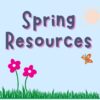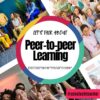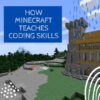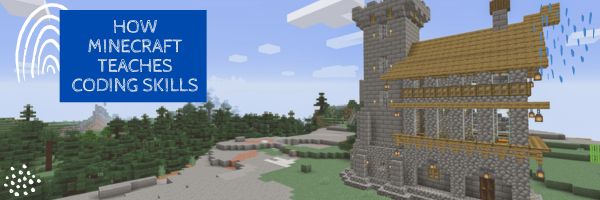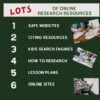Websites that add sparkle (and learning) to Spring
A few spring websites, lesson plans, printables, activities:
- 7 Science Experiments that Teach About Spring
- Books from Scholastic about Spring
- Spring Puzzle
- Spring Garden–click to find flowers
- Spring Games
- Spring Vocabulary (video)
- Spring Word Scramble
- Spring Word Search
- What Happens in Spring (video)
- What Happens in Spring–PS (video)
Life Cycles
- Life cycle of a snake
- Life Cycle Lesson Plans
- Life Cycle resources
- Life Cycles
- Life Cycle Symbaloo
- Plant life cycle
Click for ideas from TeacherVision:
Printables
- The Very Hungry Caterpillar Activities Booklet
- Butterfly Life Cycle Worksheet
- Baseball Fun
- May Day
- Butterfly Facts and Questions
- Butterfly Life Cycle Quiz
- More Spring Printables
Lesson Plans
Share this:
- Click to share on Facebook (Opens in new window) Facebook
- Click to share on X (Opens in new window) X
- Click to share on LinkedIn (Opens in new window) LinkedIn
- Click to share on Pinterest (Opens in new window) Pinterest
- Click to share on Telegram (Opens in new window) Telegram
- Click to email a link to a friend (Opens in new window) Email
- More
The Intersection of Physics and Everyday Objects
The Intersection of Physics and Everyday Objects
Physics might sound like something confined to textbooks and whiteboard scribbles, but it’s at play in our daily routines. It’s the force behind flying planes, the sparkle in our smartphone screens, and the whispers in our wireless headphones. Yet, most of us barely give it a second thought—a silent magician bringing everyday objects to life.
The Mysterious Maglev: Hovering Trains
Picture trains levitating on tracks without a single touch. Introducing magnetic levitation trains, or maglevs. With magnets defying gravity, these trains speed commuters from A to B in record time. They float, frictionless, offering a surreal ride atop a powerful physics trick. Maglevs also reflect the elegance with which physics turns weight into weightlessness, claiming new limits in transportation. By manipulating magnetic fields, maglev technology reduces almost all physical resistance, demonstrating the pure potential of movement unbound by conventional constraints.
Maglev technology isn’t just a scientific curiosity—it’s a path to environmental sustainability. With reduced friction losses and increased energy efficiency, maglev systems could significantly lower carbon emissions compared to traditional rail systems. As the demand for greener transportation solutions grows, innovations like maglev promise a future where fast, reliable transportation doesn’t have to come at an environmental cost. Moreover, with fewer moving parts, maglev trains face less wear and tear, potentially reducing maintenance costs and extending lifespans, further contributing to cost-effectiveness and sustainability.
Gyroscopes: Spinning Wonders of Balance
From the wheel in your bicycle to your smartphone’s compass, gyroscopes are hidden heroes. This rapid-spinning gizmo stabilizes and guides, keeping you oriented whether you’re navigating a trail or piloting an aircraft. The secret? Angular momentum holds its ground, a scientist’s magic trick ensuring balance. On a more grand scale, these devices play a vital role in stabilizing large marine vessels and space stations, proving that, no matter the size, balancing forces play an important part in maintaining harmony against the forces of motion.
Gyroscopes have permeated sports and gaming sectors, adding depth to user experiences. Controllers and smartphones equipped with this technology allow for intuitive controls, making virtual environments more immersive. Detecting subtle tilts and movements, gyroscopes bring tactile realism to digital adventures, bridging the gap between the physical and digital realms. As entertainment industries continue embracing these dynamics, users experience a newfound synergy between movement and on-screen action, illustrating the evolving capabilities of gyroscopic innovation.
In the vein of precision measurement, smartphone sensors also facilitate groundbreaking tools such as smartphone-based goniometers, allowing accurate angle measurements in an accessible form. Such innovations highlight how even the most intricate movements can be captured and analyzed with everyday tech, further illustrating the seamless union between physics and present-day conveniences.
Thermal Imaging: Seeing Warmth
Engineering a vision into the unseen, thermal imaging devices capture heat. At night or behind walls, they reveal the world in reds and blues, turning warm bodies, even cool machinery, into vivid portraits. Heat detection isn’t just for spies; it informs safety checks and saves lives. Beyond safety, thermal imaging has also found purpose in medicine, offering non-invasive diagnostics by revealing underlying inflammation or circulation issues, truly extending the line between vision and intuition.
Thermal imaging has ventured into new territories, discovering uses in agriculture and environmental monitoring. In farming, thermal cameras help assess plant and soil health by spotting areas of water stress. Environmentalists use these devices to monitor wildlife habitats and detect abnormalities, contributing to conservation efforts. Such applications showcase how thermal imaging can penetrate fields far removed from its origins, yielding insights with far-reaching implications both on micro and macro levels.
Smart Lightbulbs: Playing with Light
Flipping a switch to light up a room feels mundane. Yet, beneath the glow, physics dances! Smart lightbulbs manipulate photons to brighten or dim your space. Through concepts like lumens and wavelengths, light transforms into an orchestrated show at your fingertips. Interestingly, smart bulbs can also adjust to your mood or time of day, elevating your home’s ambiance effortlessly. This simple act channels complex concepts of color temperatures and energy efficiency, enhancing our lives in subtle yet remarkable ways.
Beyond aesthetics, smart lightbulbs offer a gateway to energy conservation. By allowing users to customize brightness and color temperature, they can optimize lighting to suit different activities and moods while significantly reducing energy consumption. Integrating these bulbs with home automation systems also means they can respond automatically to natural daylight, further reducing unnecessary power usage and lowering electricity bills.
Wireless Waves: Invisible Highways
Every time you stream a song or text a friend, electromagnetic waves are hard at work. Wireless communication can’t exist without them. These waves traverse invisible highways, bringing data to your device in a blink. It’s the very foundation of our connected reality. At its core, wireless technology enables seamless interaction by allowing waves to jump between frequencies. These waves skip effortlessly through urban landscapes, ensuring reliable communication even in the most unexpected corners of our bustling environments.
Quantum Tunneling: Microscopic Magic
In the microscopic realm, quantum tunneling champions the bizarre. Electrons defy boundaries, traversing barriers with inexplicable ease. Essential for devices in medicine and computers, this mind-bending phenomenon rewrites the rules we take for granted in the macroscopic world. Such behavior allows for innovations in semiconductors that power our everyday devices and fuels breakthroughs in computing power, highlighting how minute dynamics hold colossal potential for technological progress.
Conclusion
Physics isn’t confined to labs or lectures—it’s intertwined with everything around us. With every step forward, every gadget grasped, we engage in a dance with forces those familiar formulas attempt to explain. The intersection of physics and everyday objects is where the ordinary transforms into the extraordinary.
–image credit: https://www.pexels.com/photo/gray-newton-s-cradle-in-close-up-photogaphy-60582/
Here’s the sign-up link if the image above doesn’t work:
https://forms.aweber.com/form/07/1910174607.htm
“The content presented in this blog are the result of creative imagination and not intended for use, reproduction, or incorporation into any artificial intelligence training or machine learning systems without prior written consent from the author.”
Jacqui Murray has been teaching K-18 technology for 30 years. She is the editor/author of over a hundred tech ed resources including a K-12 technology curriculum, K-8 keyboard curriculum, K-8 Digital Citizenship curriculum. She is an adjunct professor in tech ed, Master Teacher, freelance journalist on tech ed topics, and author of the tech thrillers, To Hunt a Sub and Twenty-four Days. You can find her resources at Structured Learning.
Share this:
- Click to share on Facebook (Opens in new window) Facebook
- Click to share on X (Opens in new window) X
- Click to share on LinkedIn (Opens in new window) LinkedIn
- Click to share on Pinterest (Opens in new window) Pinterest
- Click to share on Telegram (Opens in new window) Telegram
- Click to email a link to a friend (Opens in new window) Email
- More
How to Change the Dynamics of Peer-to-peer Learning
Here’s what most educators and parents innately know as a truism of education:
“If you can’t explain something simply, you don’t understand it well enough.” –Albert Einstein
Peer-to-peer learning–acquiring knowledge from a peer group–has become a popular strategy as teachers move from a “teacher-lecturer” education model to “teacher-guide”. Often, it is a less stressful way to develop lifelong learners. As a pedagogical strategy, it can be effective in reinforcing critical thinking, cooperation, creativity, and problem solving–traits that are difficult to teach but essential for students who want to become productive, happy adults.
What is Peer-to-peer Learning
Peer-to-peer learning is where individuals learn from and with each other rather than relying on a traditional teacher or instructor. It involves collaboration, knowledge sharing, and mutual support among peers—typically people at a similar level of expertise or experience—working together to achieve a common learning goal. Participants exchange ideas, explain concepts, ask questions, and provide feedback. The process fosters critical thinking, communication skills, and a deeper understanding of the subject matter, as teaching others reinforces one’s own knowledge. Examples include study groups, coding boot camps where participants critique each other’s work, or online communities where users share expertise. It’s built on the idea that collective learning can be just as effective, if not more so, than top-down instruction, leveraging diverse perspectives and real-world problem-solving. (more…)
Share this:
- Click to share on Facebook (Opens in new window) Facebook
- Click to share on X (Opens in new window) X
- Click to share on LinkedIn (Opens in new window) LinkedIn
- Click to share on Pinterest (Opens in new window) Pinterest
- Click to share on Telegram (Opens in new window) Telegram
- Click to email a link to a friend (Opens in new window) Email
- More
Teacher-Authors: What’s Happening on my Writer’s Blog
A lot of teacher-authors read my WordDreams blog. In this monthly column, I share the most popular post from the past month here. If you follow WordDreams, you may have already seen this:
Share this:
- Click to share on Facebook (Opens in new window) Facebook
- Click to share on X (Opens in new window) X
- Click to share on LinkedIn (Opens in new window) LinkedIn
- Click to share on Pinterest (Opens in new window) Pinterest
- Click to share on Telegram (Opens in new window) Telegram
- Click to email a link to a friend (Opens in new window) Email
- More
Invention Convention 2025 is coming
Invention Convention Worldwide is a global K-12 curricular program mapped to national and state educational standards that teaches students problem identification, problem solving, entrepreneurship, creativity skills, and confidence. RTX Invention Convention U.S. Nationals 2025 runs June 4-6, 2025 at The Henry Ford in Dearborn, MI. (more…)
Share this:
- Click to share on Facebook (Opens in new window) Facebook
- Click to share on X (Opens in new window) X
- Click to share on LinkedIn (Opens in new window) LinkedIn
- Click to share on Pinterest (Opens in new window) Pinterest
- Click to share on Telegram (Opens in new window) Telegram
- Click to email a link to a friend (Opens in new window) Email
- More
Will AI-driven Education Replace STEM? Experts think so
When I saw this ESchoolMedia article, my first response was, He** no! but I paused to ask why a reputable magazine would even ask this question. Before reading the article, I asked Grok the same question. Here’s what a generative AI has to say about that issue:
The end of STEM: Why AI-driven education must replace an outdated model
Share this:
- Click to share on Facebook (Opens in new window) Facebook
- Click to share on X (Opens in new window) X
- Click to share on LinkedIn (Opens in new window) LinkedIn
- Click to share on Pinterest (Opens in new window) Pinterest
- Click to share on Telegram (Opens in new window) Telegram
- Click to email a link to a friend (Opens in new window) Email
- More
Minecraft Builds Coding Skills
How Playing Minecraft Can Help Students Learn Coding Skills
“Students can use Minecraft Education—which employs the sandbox building game—to get credentials in cybersecurity, coding, and AI. Students who participate in the coding pathway can earn citations for their fluency in Java and Python, two in-demand coding languages. (Nonprofit organizations, such as Code.org, also offer teachers and students low cost or free options to help students learn key computer science skills.)”
Share this:
- Click to share on Facebook (Opens in new window) Facebook
- Click to share on X (Opens in new window) X
- Click to share on LinkedIn (Opens in new window) LinkedIn
- Click to share on Pinterest (Opens in new window) Pinterest
- Click to share on Telegram (Opens in new window) Telegram
- Click to email a link to a friend (Opens in new window) Email
- More
9 St. Patrick’s Day Resources For Your Class
St. Patrick’s Day is a cultural and religious holiday celebrated in America on March 17th to honor St. Patrick, the patron saint of Ireland, credited with bringing Christianity to the country. The day is marked by parades, wearing green clothing and accessories, traditional Irish music and dance, feasting, and the symbolic consumption of foods and beverages like corned beef, cabbage, and Irish stout. It has become a global celebration of Irish culture and heritage.
If you’re getting ready for St. Patrick’s Day, try these fun websites with activities for different grade levels (click for updates on this list):
- Puzzle–St. Pat’s Puzzle
- Puzzle–St. Pat’s drag-and-drop puzzle
- Puzzle–St. Pat’s slide puzzle
- Puzzles and games
- St. Patrick’s Day history–video
- St. Pat’s Day songs–video
- Tic tac toe
- Wordsearch
Share this:
- Click to share on Facebook (Opens in new window) Facebook
- Click to share on X (Opens in new window) X
- Click to share on LinkedIn (Opens in new window) LinkedIn
- Click to share on Pinterest (Opens in new window) Pinterest
- Click to share on Telegram (Opens in new window) Telegram
- Click to email a link to a friend (Opens in new window) Email
- More
Celebrate Pi Day and Maths Day
Two math celebrations are coming up: Pi Day and World Maths Day
Pi Day
Pi Day is an annual celebration commemorating the mathematical constant π (pi). It is observed March 14 since 3, 1, and 4 are the three most significant digits of π in the decimal form.
Daniel Tammet, a high-functioning autistic savant, held the European record for reciting pi from memory to 22,514 digits in five hours and nine minutes until 2015 when Rick de Jong of the Netherlands recited pi to 22,612 digits in five hours and 34 minutes. His record was then broken by Rajveer Meena of India, who recited 70,000 digits in 2015 blindfolded. It took over nine hours. That remains the world record to date.
. Here’s how you can memorize the first 100 digits of Pi:
Share this:
- Click to share on Facebook (Opens in new window) Facebook
- Click to share on X (Opens in new window) X
- Click to share on LinkedIn (Opens in new window) LinkedIn
- Click to share on Pinterest (Opens in new window) Pinterest
- Click to share on Telegram (Opens in new window) Telegram
- Click to email a link to a friend (Opens in new window) Email
- More
LOTS of Resources for Kids’ Online Research
Here are quick, safe spots to send students for research (click here for updates to the list):
- CoolKidFacts–kid-friendly videos, pictures, info, and quizzes–all 100% suitable for children
- Dimensions–academic research geared for college-level
- Fact Monster–help with homework and facts
- Google Earth Timelapse–what changes to the planet over time
- Google Trends–what’s trending in searches
- History Channel–great speeches
- How Stuff Works–the gold standard in explaining stuff to kids
- Info Please–events cataloged year-by-year
- National Geographic for Kids
- Ngram Viewer–analyzes all words in all books on Google Books
- TagGalaxy–search using a cloud
- Wild Wordsmyth–picture dictionary for kids
- World Book–requires membership
Citing Resources
Kids Search Engines
How to Research
- A Google A Day
- How to Search on Google
- Power Searching (with Google)
- Teaching students to search/research
- Internet Search and Research–a lesson plan for K-8
Lesson Plans
Resources/Research
- BrainPOP–Bring learning to your fingertips™ with the BrainPOP® Featured Movie app
- Kids Picture Dictionary
- Primary Source Documents
- SparkVue–collect and display live data from iPhone etc to the iPad
- Talk to Books–research your topic based on books
- TED app–TED’s official app presents talks from some of the world’s most fascinating people
Share this:
- Click to share on Facebook (Opens in new window) Facebook
- Click to share on X (Opens in new window) X
- Click to share on LinkedIn (Opens in new window) LinkedIn
- Click to share on Pinterest (Opens in new window) Pinterest
- Click to share on Telegram (Opens in new window) Telegram
- Click to email a link to a friend (Opens in new window) Email
- More

